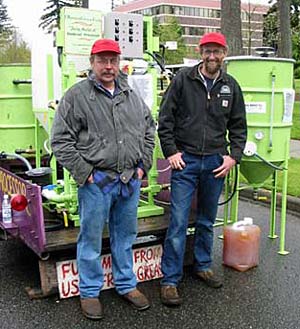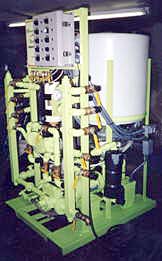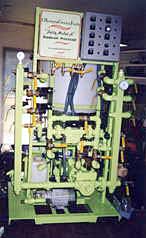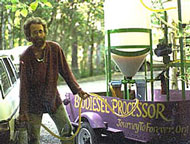
The design and fabrication team: Mike with Jerry Cook (left).
|
A lot of thinking and a lot of good ideas have gone into Mike Pelly's "Model A" biodiesel processor. The fourth and final prototype is fully operational, works "like a charm", and is heading for full-scale production.
Mike Pelly is one of the mainstays of the burgeoning biodiesel movement. He's been making biodiesel and teaching other people to make it for a long time. Thousands of people all over the world are making biodiesel after reading Mike's method at our website.
The Pelly "Model A" modular skid-mounted biodiesel processor can be configured for batches of 25 to 400 gallons (95 to 1,500 litres).
These processors will convert both fresh and waste vegetable oil into a washed and polished biodiesel capable of meeting ASTM standards.
Processor turnover time is 48 hours (transesterification only), high free fatty acid content oil takes longer. The "Pelly Model A" will transesterify up to 2000 gallons per day with five 400 gallon batches in an 8-10 hour working day. The fuel is washed and polished overnight without operator assistance by the "Pelly Model A" microprocessor-run wash-system. Total operator time required is about 8 hours per 2000 gallons of oil processed. Total operator time per batch is about 45 minutes.
Operator exposure to oils, chemicals, soaps and poisonous vapors is eliminated with the sealed system design.
The Sodium Hydroxide or Potassium Hydroxide catalyst is introduced into the system in much the same way as soap is added to a laundry washing machine. All fluids are handled with pumps, valves and drains from the drums, and finally to the fuel tank. The operator does not need to handle or lift any of the fluids to operate the processor -- all that's needed is to turn a valve or flip a switch on the control panel.
These systems have a methanol recovery system for reclaiming excess methanol.
Full-scale production is expected to commence soon, with prices depending on configuration.
Though it's called the "Pelly Model A", this is the fifth prototype, in a different league from the first in the series.
"It's called the Pelly Model A because it's really just the start with this design," says Mike. "Jerry and I have a whole lot of ideas we'll be developing. We're just getting started. Down the road they'll be able to work continously with microprocessors, or as batch processors, whichever you wish. We're also working on a centrifuge to separate the biodiesel from the glycerine -- that alone will double the daily capacity of these processors. We'll be able to retro-add the centrifuges and other refinements later to earlier-model processors."
Meanwhile the first two production-ready Pelly Model A's are at work producing biodiesel at Mike's company, Olympia Green Fuels in Olympia, Washington.
http://www.olympiagreenfuels.com/
Email: Mike Pelly <renewablenergies@yahoo.com>
|
|
|
|
|
|
|
|
|
|
|
|
 |
|
 |
|
|
 |
|
|
Mike fueling up from Prototype #2
|
|
|
|
|
|
|
Side view, left, and front , above, of the skid mounted "Pelly Model A" #5. |
|
Biodiesel processors
Introduction
Scaling up
Hazards
Test-batch mini-processor
Simple 5-gallon processor
Journey to Forever 90-litre processor
The 'Deepthort 100B' Batch Reactor
Ian's vacuum biodiesel processor
Chuck Ranum's biodiesel processor
Pelly "Model A" processor
"Foolproof" method processors
The touchless processor
Joe Street's processor
Continuous reactors
How to make a cone-bottomed processor
Biodiesel technology
Biofuels at Journey to Forever
Biofuels
En español -- Biocombustibles, biodiesel
Biofuels Library
Biofuels supplies and suppliers
Biodiesel
Make your own biodiesel
Mike Pelly's recipe
Two-stage biodiesel process
FOOLPROOF biodiesel process
Biodiesel processors
Biodiesel in Hong Kong
Nitrogen Oxide emissions
Glycerine
Biodiesel resources on the Web
Do diesels have a future?
Vegetable oil yields and characteristics
Washing
Biodiesel and your vehicle
Food or fuel?
Straight vegetable oil as diesel fuel
Ethanol
Ethanol resources on the Web
Is ethanol energy-efficient?




